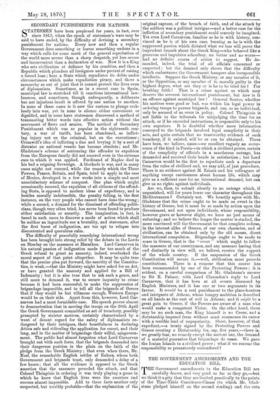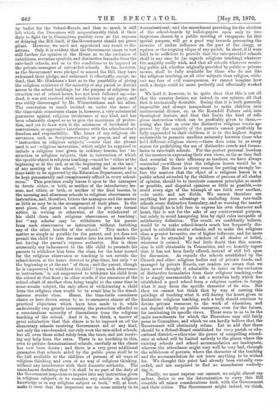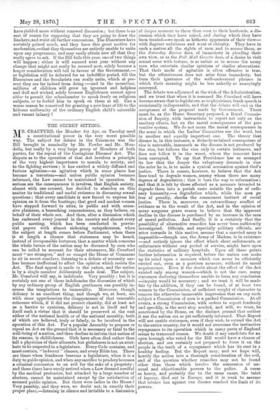THE GOVERNMENT AMENDMENTS AND THE EDUCATION BILL.
THE Government amendments to the Education Bill are carefully drawn, and very good so far as they go,—but we think it a pity that they are limited practically to the points of the Time-Table Conscience-Clause (to which Mr. Glad- stone pledged himself on the second reading) and the vote by ballot for the School-Boards, and that so much is still left which the Dissenters will unquestionably think it their duty to fight for in Committee, possibly even at the expense of delaying the Bill itself, if the Government should not prove pliant. However, we need not apprehend any result so dis- astrous. Only it is evident that the Government mean to test still further the opinion of the House as to the exclusion of catechisms, sectarian symbols, and distinctive formulas from the rate-built schools, and as to the conditions to be imposed on the private managers of rate-aided schools. So far, however, as the Government were pledged to amend the Bill, they have redeemed their pledge, and redeemed it effectudly, except, in- deed, that Mr. Gladstone's hint as to the possibility of giving the religious ministers of the minority of any parish or district access to the school buildings for the purpose of religious in- struction out of school-hours, has not been followed up,—in- deed, it was not received with much favour by any party, and was coldly discouraged by Mr. Winterbotham and his allies. The concession so much insisted on under the name of the time-table conscience clause is, however, a very substantial guarantee against religious intolerance of any kind, and has been admirably shaped so as to give the maximum of protec- tion, and yet to draw with it the minimum of incidental in- convenience, or oppressive interference with the schoolmaster's freedom and responsibility. The hours of any religious ob- servances, such as Scripture-reading or prayer, and of any "instruction in religious subjects,"—note that the phrase used is not religious instruction,' which might be supposed to include a religious tone given to ordinary lessons, but 'in- struction in religious subjects,' that is, instruction of which the specific object is religious teaching,—must be "either at the beginning or at the end, or at the beginning and at the end," of any meeting of the school, "and shall be inserted in a time-table to be approved by the Education Department, and to be kept permanently and conspicuously affixed in every school- room." This provision really leaves it open to the managers to devote either, or both, or neither of the introductory les- sons, and either, or both, or neither of the final lessons, in the morning and afternoon schools to religious observances or instruction, and, therefore, fetters the managers and the master as little as may be in the arrangement of their plans. In the next place, the parent is not required to give any formal notice, in writing or otherwise, of the withdrawal of his child • from such religious observances or teaching ; but "any scholar may be withdrawn by his parent from such observances or instruction without forfeiting any of the other benefits of the school." This makes the matter as simple as possible for the parent, and yet does not permit the child to take the matter into his own hands with- out having the parent's express authority. Nor is there necessarily any inducement to the idle child to persuade his parents to withdraw him from the class, for the hour named for the religious observance or teaching is not outside the school-hours, or the hours devoted to play-time, but only "at the beginning or at the end" of them ; and the parent, though he is empowered to withdraw his child " from such observance or instruction," is not empowered to withdraw his child from the school at that hoar ; in other words, if the resources of the school admit of another class being taught at the same time in some secular subject, the only effect of withdrawing a child from the religious class would be to remit him to the simul- taneous secular class. Hence, the time-table conscience clause as here drawn seems to us to surmount almost all the practical objections which have been made to it, while undoubtedly very greatly increasing the protection afforded to a conscientious minority of dissentients from the religious teaching of the school. And it is, we think, a matter of great satisfaction that this clause is to be imposed on all the elementary schools receiving Government aid of any kind, not only the rate-founded, nor only even the rate-aided schools, but all, even those aided solely from the taxes, and not receiv- ing any help from the rates. There is no hardship in this, even to private denominational schools, carefully as the clause has now been drawn ; and there is a very great additional guarantee that schools aided by the public purse shall be to the full available to the children of persons of all ways of religious thinking, and even of no way of religious thinking, without any interference with their domestic authority. The amendment declaring that "it shall be no part of the duty of the Government inspectors to inquire into any instruction given in religious subjects, or to examine any scholar in religions knowledge or in any religious subject or book," will, at least, make it clear that the inspectors are to cease entirely to be denominational; and the amendment providing for the election of the school-boards by ballot-papers open only to two inspectors chosen by a public meeting of ratepayers for this special purpose, will go a good way towards preventing the' exercise of undue influence on the part of the clergy, or squires, or the reigning clique of any parish. In short, if it were- held to be sufficient to provide that the rate-provided schools shall in any case be (as regards religions teaching) whatever the majority really wish, and that all schools whatever receiv- ing public aid, whether originally provided by public or private. means, shall be fully available for those who do not like- the religious teaching, on all other subjects than religion, with- out any fear of evil consequences, we cannot imagine how such a design could be more perfectly and effectually worked. out.
We hold it, however, to be quite clear that this is not all that the country desires, nor indeed, in our opinion, all that that is intrinsically desirable. Seeing that it is both generally impossible and always inexpedient to make children into controversial divines, or, as Sir Roundell Palmer said, into theological doctors, and that this limits the kind of reli- gious instruction which can be profitably given to them,— seeing also that as even the distinctive religious tenets ap- proved by the majority of the parents cannot profitably be fully expounded to their children, it is in the highest degree undesirable to promote needless animosity between those who hold different religious views,—there does seem to us every reason for prohibiting the use of distinctive creeds and formu- laries in rate-built schools. For the perfect personal freedom of the masters in expressing their own views, so far as they find that essential to their efficiency as teachers, we have always contended ;—without that the religious lesson would be a mockery. But there is every reason for putting strongly be- fore the masters that the object of a religious lesson in a public school attended by the children of persons of all shades of opinion, should be to inculcate common principles as much_ as possible, and disputed opinions as little as possible,—to- avoid every, sign of the triumph of one faith over another, —to unite, and not divide. We cannot therefore sea anything but pure advantage in excluding from rate-built schools every distinctive formulary, and so warning the master that though he is left free to express his own character and heart, this is not for the sake of any controversial purpose, but solely to avoid hampering him by rigid rules incapable of' satisfactory definition. The result, we confidently believe, would be to make school-boards much less frequently dis- posed to establish secular schools, and to make the religions class a greater favourite, one of higher influence, and far more likely to be attended by scholars of all shades of belief, ,. wherever it existed. We feel little doubt that this conces- sion is still obtainable in Committee, and we heartily regret that it has not been freely offered, instead of still left open for discussion. As regards the schools established by the- Church and other religious bodies out of private funds, and managed by private Boards, our readers are aware that we have never thought it admissible to insist on the exclusion of distinctive formularies from their religious teaching,—for it is simply unreasonable to ask a sectarian body which has. established a good school from a religious motive, to forego what it may deem the specific character of its aim. But then we cannot but think that by way of earning this- privilege of teaching what it will during the hours given to distinctive religious teaching, such a body should continue to- devote private resources to the work of education, and not depend wholly on public resources, even for the future, for inculcating its specific views. These seem to us to be the- main amendments for which the Dissenters may still fairly press in Committee, and which we can hardly believe that the- Government will obstinately refuse. Let us add that there should be a School-Board established for every parish or edu- cational district,—otherwise the power of compelling attend- ance at school will be limited entirely to the places where the- existing schools and school accommodation are inadequate,. whereas the attendance might very well be very bad, through the selfishness of parents, where the character of the teaching and the accommodation do not leave anything to be wished for. We thought this point had already been virtually con- ceded, and are surprised to find no amendment embody- ing it. Finally, we must express our earnest, we might almost say ardent, desire to see the determination to carry this Bill override all minor considerations both with the Government and their critics. The Government might indeed, we think, have yielded more without renewed discussion ; but there is no sort of reason for supposing that they are going to draw the linehere, and resist all further concessions. The Dissenters have certainly gained much, and they have this great motive for moderation,—that they themselves are entirely unable to unite upon any programme, and may easily obtain now all that they really agree to ask. If the Bill fails this year, one of two things will happen ; either it will succeed next year without any change that might not easily be secured now, solely because a longer consideration will tell in favour of the Government,— or legislation will be deferred for an indefiffite period, till the Dissenters and the Secularists can really unite, which at pre- sent they are far indeed from doing :—and in the meantime, millions of children will grow up ignorant and helpless and dull and wicked, solely because Englishmen cannot agree either to permit the schoolmaster to speak freely on religious subjects, or to forbid him to speak on them at all. Can a worse reason be conceived for granting a new lease of life to the hideous uniformity of the ordinary English child's miserable and vacant infancy ?
































 Previous page
Previous page